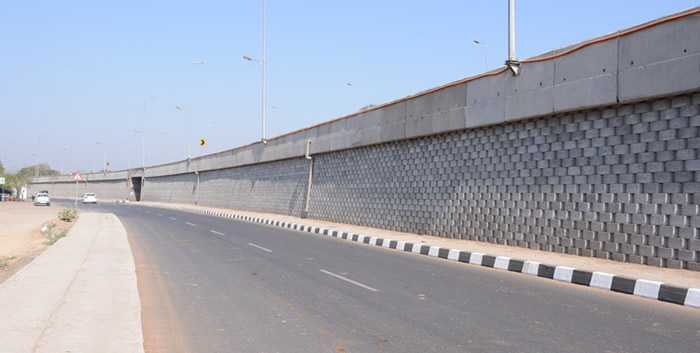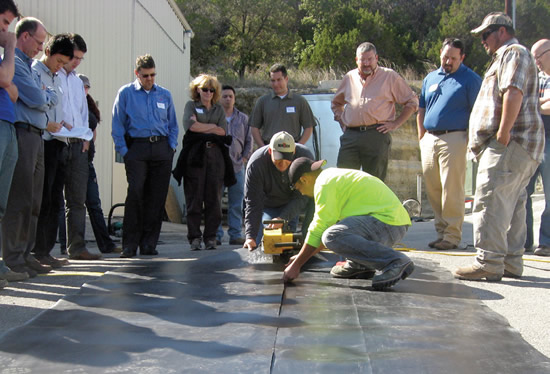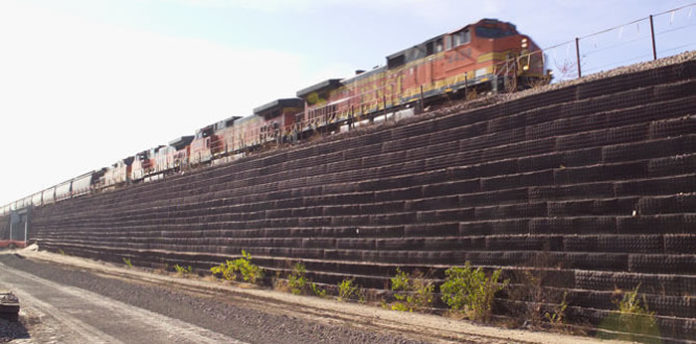Geosynthetic reinforced soil structures (GRSS) have had a highly beneficial impact on infrastructure throughout the world. GRSS strategies, materials, and designs enable more sustainable projects, steeper slopes, safer retaining walls, and more. A high-level and highly successful course on the topic—Geosynthetic Reinforced Soil Structure Design and Construction: Slopes, Walls and Roads—was delivered in India in early December. Now, the two-day short course with an optional certification exam is coming to the United States.
In April, lead instructor and renowned GRSS practitioner Michael Bernardi, P.E. will present alongside a roadway expert (to be announced shortly). Their reinforced soil structures course is part of the inaugural Geo-U event in Austin, Texas (8 – 10 April 2020).
RELATED: GEO-U Adds Course on Landfill Design Considerations in the Age of Sustainability
GEOSYNTHETIC REINFORCED SOIL STRUCTURES COURSE
Every geotechnical and civil engineering company should expand their knowledge in GRSS technologies, designs, and benefits—especially if they have any business involvement in transportation engineering.

In Austin, Bernardi will focus on retaining walls, steepened slopes, and roadways. A brief background of the application of each of these technologies will be presented, including the advantages, economic considerations, and limitations of each type of system as compared to other conventional practices.
Details concerning the design, selection of reinforcing materials, specification and construction of each type of system will be covered. Current design codes/standards and software will be referenced and summarized. Special issues that have on occasion resulted in undesirable performance will be reviewed. An overview of several recent innovations such as the combination of reinforcement with lightweight fill and newly developed alternative design procedures will also be presented. Each attendee will be given course notes to support the class, which include step-by-step design procedures and example problems.
Every geotechnical and civil engineering company should expand their knowledge in GRSS technologies, designs, and benefits—especially if they have any business involvement in transportation engineering.
The learning objectives for the geosynthetic reinforced soil structures course, as posted on the event page online:
- Understand the key elements regarding design of reinforced soil structures
- Provide a working knowledge suitable for preliminary design of reinforced soil structures
- Identify those resources and guidelines publicly available to assist in design of retaining walls, steepened slopes and roadways
Learn more about the class and instructors. Register by January 31 to save $100 or more on registration.
GEO-U 2020 COURSES
A welcome reception will be held on the evening of April 7 at the Sonesta Bee Cave Austin Hotel (venue for all courses). Then, on April 8 and 9, four concurrent short courses will be held:
Geosynthetic Reinforced Soil Structure Design and Construction: Slopes, Walls and Roads
Instructor: Michael Bernardi, P.E.
Optional certification exam included. (Exam on April 10 in the morning.)
QA/QC of Geosynthetic and Compacted Clay Lining Systems
Instructors: Mark Sieracke, P.E., Dr. Jeffrey Kuhn, P.E., and Sam Allen.
Optional certification exams (GCI-ICP) offered on April 10 in the morning. These exams require a proxy fee paid to the event and addition pre-registration with the Geosynthetic Institute.
Landfill Design Considerations in the Age of Sustainable Development
Instructors: Dr. George Koerner, P.E. and Abigail Gilson, MS, P.E.
Optional certification exam included. (Exam on April 10 in the morning.)
Geosynthetics in Stormwater Controls and Hydraulic Engineering
Instructor: C. Joel Sprague, P.E.
Optional certification exam included. (Exam on April 10 in the morning.)
On April 10 in the first half of the day, as certification exams are offered, a special Marketing in the Geosynthetics Field half-day short course will be offered.

NETWORKING & SOCIAL OPPORTUNITIES
April 7 – Meet the Teachers Reception
5:00 – 7:00 pm
Sonesta Bee Cave Austin Hotel
April 8 – Geosynthetics & Geotechnical Lab Technical Tour + Geo-U Blast
6:00 – 9:30 pm
Bus transportation provided from the Sonesta
SPONSORED BY TRI ENVIRONMENTAL
April 9 – GeoU 2020 Happy Hour
5:00 – 7:00 pm
Sonesta Bee Cave Austin Hotel
Learn more about Geo-U 2020, the courses, the instructors, and the networking opportunities at www.geo-u.com.
[adsanity id=”96962″ align=”aligncenter”/]












